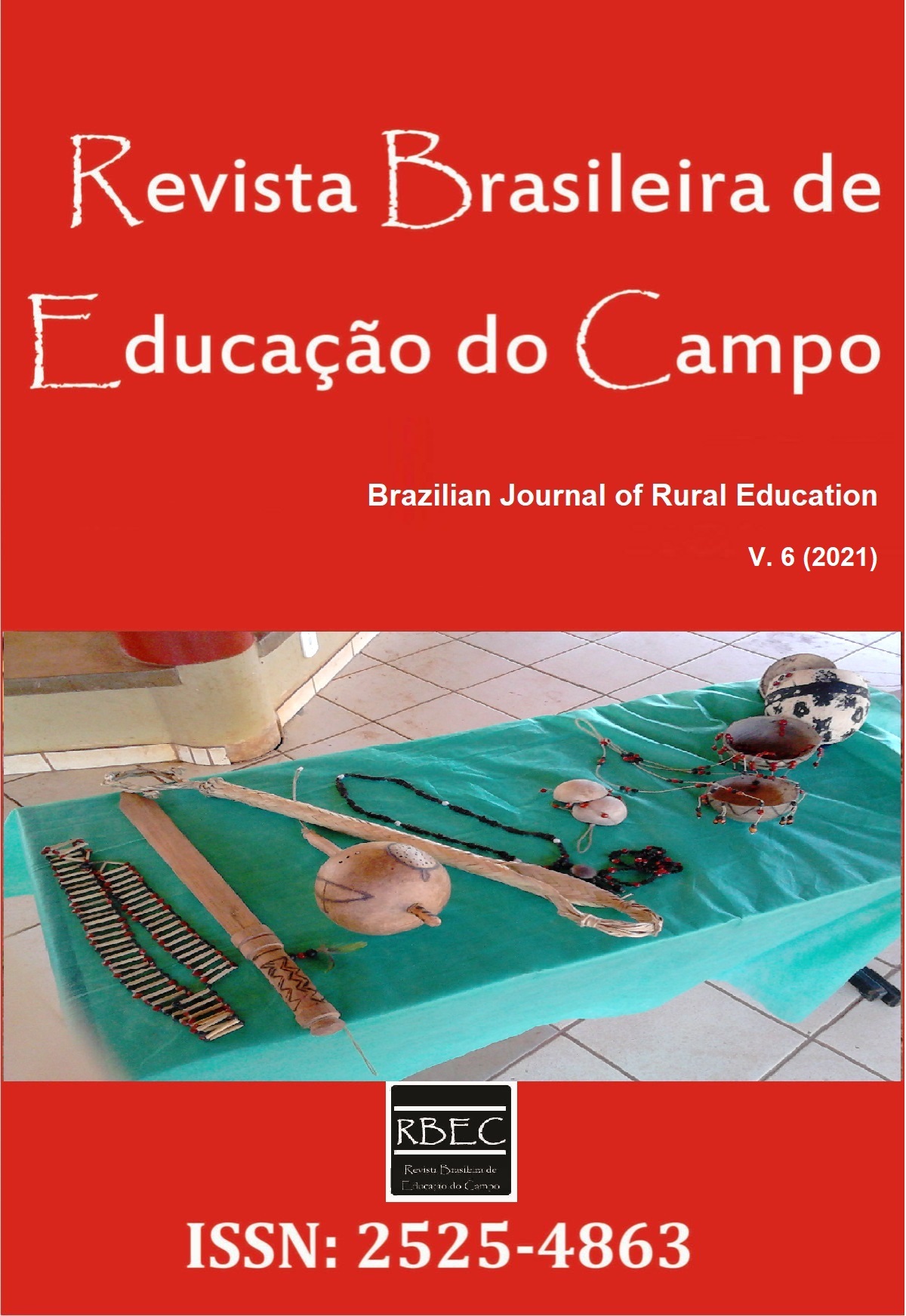For a Circular Education: sustainable transition in the pandemic context
DOI:
https://doi.org/10.20873/uft.rbec.e11927Abstract
This theoretical essay presents a brief literature review on the Business Model in Circular Economy (CE) and aims to answer the question: what would be the main aspects of the circularity to integrate Countryside Education in the current context of the COVID-19 pandemic in Brazil? In an essayistic manner, the study made it possible to reflect critically on the opportunities that CE can represent for Countryside Education. The results reveal converging aspects between Countryside Education and CE and that could be seen as a reference for solutions that deeply comprise the cause of socio-environmental problems currently present in the life and production in rural territories in Brazil.
Downloads
Literaturhinweise
Arroyo, M. G. (2012). Outros Sujeitos, Outras Pedagogias. Petrópolis, RJ: Vozes.
Azevedo, J. L. (2015). A Economia Circular Aplicada no Brasil: uma análise a partir dos instrumentos legais existentes para a logística reversa. In Anais do XI Congresso Nacional de Excelência em Gestão (pp. 1-16). Rio de Janeiro, RJ.
Baremblitt, G. (2002). Compêndio de análise institucional: e outras correntes - teoria e prática. Belo Horizonte: Instituto Félix Guattari.
Brasil. Ministério da Educação e Cultura (2001). Recuperado em: http://pronacampo.mec.gov.br/images/pdf/mn_parecer_36_de_04_de_dezembro_de_2001.pdf
Distrito Federal. Secretaria de Educação do Distrito Federal. (2018). Diretrizes pedagógicas da educação básica do campo para a rede pública de ensino do Distrito Federal. Brasília: GDF.
Campos, M. (2015). O Ensaio Acadêmico: a reflexão escrita na área jurídica. Mariana, MG: Edição do autor.
Castel, R. (1998). As metamorfoses da questão social: uma crônica do salário. Petrópolis, RJ: Vozes, 1998.
Cezar, L., & Silva, M. (2016). Educação do campo: uma relação entre currículo e valorização da cultura campesina In Anais do 2º Encontro Missionário de Estudos Interdisciplinares em Cultura (pp. 1-10). São Borja, RS.
Costa, M. L., & Cabral, C. L. O. (2016). Da Educação Rural à Educação do Campo: uma luta de superação epistemológica/paradigmática. Revista Brasileira de Educação do Campo, 1(2), 177-203. https://doi.org/10.20873/uft.2525-4863.2016v1n2p177
Costa, M. Q., Monteiro, I., & Ribeiro, V. R. (2019). Educar para a Economia Circular – uma experiência inovadora na formação de professores. Saber & Educar 27, 1-11.
Duthie, A. C. R., & Lins, F. (2017). A Economia Circular e Sua Relação com a Mineração. Economia Mineral. Brasil Mineral, 374, 66-70.
Dweck, C. (2017). Mindset: a nova psicologia do sucesso. São Paulo, SP: Editora Objetiva.
Esmeraldo, G. G. S. L., Molina, M. C., & Antunes-Rocha, M. I. (2017). O fortalecimento da identidade camponesa: repercussões do Programa Nacional de Educação na reforma agrária nos estados do Ceará, Minas Gerais e Paraná (1998-2011). Educação & Sociedade, 38(140), 569-585. https://doi.org/10.1590/es0101-73302017180449
Goleman, D. (2012). Inteligência emocional: a teoria revolucionária que redefine o que é ser inteligente. Rio de Janeiro, RJ: Editora Objetiva.
Jabbour, A. B. L. S., Luiz, J. V. R., Luiz, O. R., Jabbour, C. L. C. Ndubisi, N. O., Oliveira, J. H. C., & Júnior, F. H. (2019). Circular Economy Business Models and Operations Management. Journal of Cleaner Production, 235, 1525-1539. https://doi.org/10.1016/j.jclepro.2019.06.349
Le Blanc, G. (2011). Que faire de notre vulnão érabilité ? Le temps d’une question. Montrouge: bayard.
MacArthur, E. (2018). Momentum building towards the circular economy. Recuperado de: https://www.youtube.com/watch?v=1Z9B-tdYOmE.
Molina, M. C., & Freitas, H. C. A. (2011). Avanços e desafios na construção da Educação do Campo. Em Aberto, 24(85), 17-31.
Monteiro, J. (2021). O conceito de Perejivanie na prática educacional: Um encontro com educadores sociais musicistas. Revista Universidade Vale do Rio Verde, 1(18), 78-98.
Nascimento, K., Galvão Júnior, & Oliveira (2019). Educação Campesina: cirrículo, identidade e diversidade cultural da Escola Municipal Oziel Alves. Latin American Journal of BUiness Management, 10(2), 14-23.
Resende, C. C (2019). O mundo do trabalho na era organizacional: história, crítica e perspectivas. Belo Horizonte, MG: PSI Edições Acadêmicas.
Ribeiro, L. P., & Resende, C. C (2017). Breve ensaio sobre o conceito de vulnerabilidade social: exclusão social, trabalho, democracia e empoderamento. Percurso Acadêmico, 7(14), 378-400. https://doi.org/10.5752/P.2236-0603.2017v7n14p378-400
Sassanelli, C., Rosa, P., Rocca, R., & Terzi, S. (2019). Circular economy performance assessment methods: A systematic literature review. Journal of Cleaner Production, 229, 440-453. https://doi.org/10.1016/j.jclepro.2019.05.019
Sawaia, B. B. (2009). Psicologia e desigualdade social: uma reflexão sobre liberdade e transformação social. Psicologia & Sociedade, 21(3), 364-372. https://doi.org/10.1590/S0102-71822009000300010
UNESCO. (2015). Educação para cidadania global: preparando alunos para o desafio do século XXI. Brasília: UNESCO.
Weetman, C. (2019). Economia Circular: conceitos e estratégias para fazer negócios de forma mais inteligente, sustentável e lucrativa. São Paulo: Autêntica Business.
WEF. Fórum Econômico Mundial (2020). Inteligência Estratégica: a grande redefinição. Recuperado em: https://intelligence.weforum.org/topics/a1G0X000006OLciUAG?tab=publications&utm_sour
Veröffentlicht
Zitationsvorschlag
Ausgabe
Rubrik
Lizenz
Creative Commons Attribution License
Creative Commons Attribution License
Proposal for Copyright Notice Creative Commons
1. Policy Proposal to Open Access Journals
Authors who publish with this journal agree to the following terms:
A. Authors retain copyright and grant the journal right of first publication with the work simultaneously licensed under the Creative Commons Attribution License that allows sharing the work with recognition of its initial publication in this journal.
B. Authors are able to take on additional contracts separately, non-exclusive distribution of the version of the paper published in this journal (ex .: publish in institutional repository or as a book), with an acknowledgment of its initial publication in this journal.
C. Authors are permitted and encouraged to post their work online (eg .: in institutional repositories or on their website) at any point before or during the editorial process, as it can lead to productive exchanges, as well as increase the impact and the citation of published work (See the Effect of Open Access).














